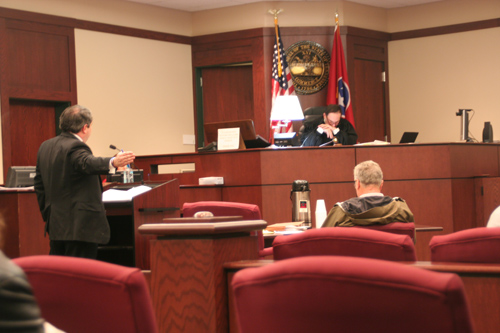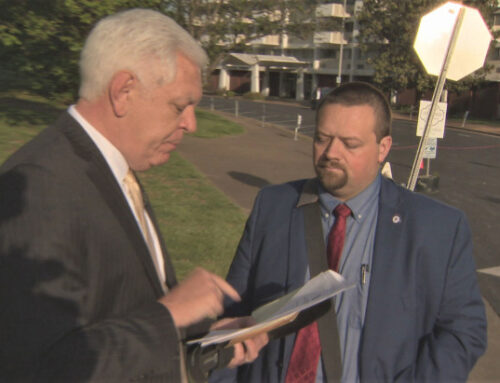
Sumner County Judge Dee David Gay listens to arguments by attorney Kirk Clements, who says his client was wrongly denied access to public records.
GALLATIN — The Sumner County School Board lost the first round in a court fight Friday to be able to reject public records requests from citizens who make those requests by email or phone.
The school district’s policy requires citizens to make public records requests by U.S. mail or by appearing in person, according to Jeremy Johnson, the school district’s board and community relations supervisor.
Because of this, Johnson told citizen Ken Jakes that his request by email to view a public record was not valid and would not be accepted. Jakes described the record and asked to be contacted when the record was available for him to come view. Jakes had also left a voice mail with Johnson about the request.
In a court hearing Friday in Gallatin, the school district’s lawyer, Todd Presnell, argued that Jakes had to follow the policy of the school district, and that accepting public records requests by email would be burdensome to government. He also argued that because the record that Jakes requested was already on the school district’s website, it had already satisfied the responsibility of making the record accessible to him and did not have to specifically respond to Jakes’ request.
Sumner County Judge Dee David Gay denied the district’s motion for a summary judgment (motion to dismiss), and said that state law “requires that a county official may not refuse inspection of any public record to any citizen of Tennessee unless otherwise provided by state law.”
He said Jakes had stated a valid claim that he was denied access to view a public record, and the case could go forward.
During the hearing, Judge Gay said that government should be looking for ways to make things easy for the public to see a public record. He told the attorneys that while the issue of responding to a citizen’s request to inspect a public record, “may seem like a nitpicky issue,” it was an important point in the law.
The public records lawsuit against Sumner County schools stems from a records request Jakes made by email to Johnson on March 21, 2014, asking to inspect and review the “records policy for the Board of Education.” Jakes said in the email “If the records policy is on line you can simply provide the link. If not contact me when ready for my review.”
Johnson responded, also by email, saying a records request had to be made by U.S. mail or in person, and that his request over email would not work.
The judge took the school district to task for Johnson’s response: “Why didn’t you just say, the link is such and such and you can go right to it. Isn’t that kind of in compliance with the policy of the Open Records Act?”
“Then you come in (to court) and say (the records policy is) online, but you didn’t mention it in your response (to Jakes)? That doesn’t make much sense to me,” Gay said. “…You didn’t give him access. If you had done it, we wouldn’t be here.”
“I just don’t think it’s fair, I don’t think it’s equitable, I don’t think it’s right to say this case is moot on the grounds that the information is available online and yet the defendant didn’t say a word” to Jakes about the information being online at the time
“It just doesn’t smell right,” the judge said.
During the hearing, the judge also read from the “Best Practice Guidelines for Records Custodians Responding to Requests for Public Records” on the state’s Office of Open Records Counsel website that encourages governments to “respond to all records requests in the most economical and efficient manner possible.” It also recommends that whenever records are maintained electronically, “records custodians should produce records request electronically.”

Citizen Ken Jakes requested to inspect the school board’s public records policy, but because his request was made by email and phone, the school district said it would not respond.
Jakes’ attorney, Kirk Clements with Haynes, Freeman & Bracey, argued in his pleadings that the school district did not comply with Jakes’ request to view the school board’s public records policy, even if it had part of a policy online at the time. The policy online does not include the requirement Johnson communicated to Jakes — that requests must be made by U.S. mail or in person. When the school district filed its motion to dismiss the lawsuit, it revealed that an addition was made to its public records policy on March 20, 2014, a day before Jakes made his request. But the policy online in late March does not match a newer policy online now. And neither of the written policies contain the requirement that requests to see public records must be in person or by mail.
“The facts demonstrate that only part of the Defendant’s policy was on its website. As established by (the school board’s) own filing, (it) has two different written policies (and, apparently, a separate unwritten policy as Mr. Johnson may decide on a case by case basis).”
Clements said all the actions by the school district bring into question the motivations of Johnson or his boss, director of schools Del Phillips. He asked the court to compel the school district to respond to his discovery requests, and allow for depositions.
“It stretches the boundaries of credulity that the (school board) coincidentally adopted the policy the day before Mr. Jakes made his records request” and less than two weeks after another citizen requested to see financial expenditures by teachers, Clements wrote in his opposition to the school district’s motion to dismiss the case.
“It is clear from the timing of the ‘adoption’ of this policy and the lack of common sense or logic underpinning such policy that Mr. Del Phillips, the Director of Schools for Sumner County Board of Education, simply wishes to frustrate the citizens from making records request that seek to inspect the financial expenditures of the Defendant.”
The judge denied Clements’ request.
But he pointed out in the hearing that the school board’s written records policy does contain a very specific problem as it relates to responding to public records requests. It states that requesters must fill out a form developed by the Office of Open Records Counsel to make a request to inspect public records.
Judge Gay said the law was clear that local and state governments in Tennessee cannot require requests to inspect public documents to be in writing, though they can require requests for copies of public records to be in writing.
“10-7-503-(a)(7)(A) A records custodian may not require a written request or assess a charge to view a public record unless otherwise required by law; however, a records custodian may require a request for copies of public records to be in writing or that the request be made on a form developed by the office of open records counsel.”
Presnell, the school district’s attorney, said his client may consider appealing to the Court of Appeals the judge’s denial to dismiss the lawsuit. (Here are the school district’s pleadings, outlining its arguments for dismissing the case.)
Frank Gibson, the public policy director of the Tennessee Press Association, and founding director of Tennessee Coalition for Open Government, said the school district needs to simply comply with the public records law as it goes about its business.
“This is an incredible waste of taxpayer money, and I hope the school board does not waste more on an appeal, Gibson said. “As the judge pointed out, this could have been fixed with 25 keystrokes on a computer.”
Tennessee Coalition for Open Government is a nonpartisan, nonprofit organization whose mission is to protect and preserve access to government information. More information about its programs can be found on its website: history and programs. Deborah Fisher is TCOG’s executive director and can be reached at [email protected].







